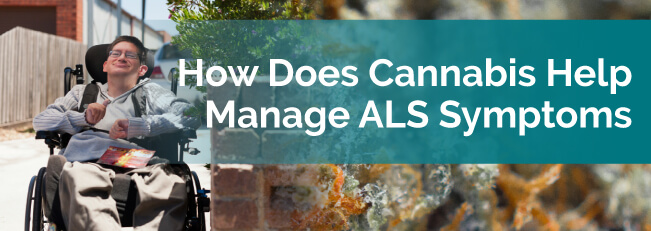
Currently, we don’t have a cure for amyotrophic lateral sclerosis. Like other incurable diseases, physicians try to manage the symptoms of ALS while researchers look for a cure. Since the current medicine on the market doesn’t cure ALS, we must think outside the box to find a remedy.
One of the medications for directly addressing ALS that we study is medical marijuana. With the increasing recognition of cannabis as a legitimate medicine, more research opportunities arise for scientists exploring its medicinal uses. As we continue to learn about applications for cannabis medicine, we ask questions about its ability to treat incurable conditions.
Amyotrophic lateral sclerosis is a progressive neurodegenerative disease. That means it affects your brain and spinal cord while progressively becoming more severe. It interferes with the way you control your body, reducing your motor function.
We divide ALS into two types:
When you have ALS, the cells in your brain and spinal cord die off due to a lack of nourishment. The cells in your nervous system become damaged and scarred, eventually dying altogether. Once enough cells die, the patient experiences paralysis until they pass away.
To understand how marijuana works to address symptoms, we need to understand how cannabinoids work.
Cannabis has more than 85 components called cannabinoids that can be isolated to provide specific health benefits. Our bodies have an endocannabinoid system that creates and receives cannabinoids. The research we conduct on marijuana medicine and its effect on ALS looks at the way that certain cannabinoids impact the condition.
The two cannabinoids we know the most about are tetrahydrocannabinol (THC) and cannabinol (CBD). THC causes psychoactive effects that we associate with the “high” provided by marijuana. CBD doesn’t make you feel a high and is known more for its medical benefits — although THC impacts your health, as well.
We still need more data on most illnesses and how patients react to medical weed. However, the federal prohibition of marijuana use makes it difficult to get approval to research the drug. Like other conditions, our marijuana-related research on ALS is in preliminary stages, but the research we have so far shows promise.
Looking at the data we have, it seems like THC and CBD could work in tandem to slow down ALS progression. Since ALS is an incurable lethal disease, finding ways to impede its progress as much as possible is a great accomplishment. By slowing ALS down, we can improve the quality of patients’ lives while we research further for a cure.
Spasticity, one of the major symptoms of ALS, makes mobility harder. Plus, muscle spasms can result in chronic pain and muscle weakness. Doctors typically prescribe muscle relaxants for muscle spasms.
But, medical marijuana could work as a replacement for muscle relaxants. The research we’ve done so far suggests cannabis relaxes your muscles, reducing the frequency of muscle spasms. If we can use marijuana to replace muscle relaxants, it will give patients more medication options and allow them to avoid the side effects of muscle relaxants.
ALS can put a patient through severe, chronic pain. A lot of studies on the medical application of weed focus on marijuana’s painkilling properties. Since pain is such a common symptom of chronic conditions, having another painkiller in our medical repertoire can help patients out.
The evidence we have points to weed working as a treatment for ALS-related pain. Painkillers currently on the market can damage your liver and can result in dependency, while marijuana has less dangerous side effects.
Our condition guide can help you learn more about weed and ALS. A well-trained marijuana doctor can also point you to resources on the subject, along with a staff member at a dispensary near you.